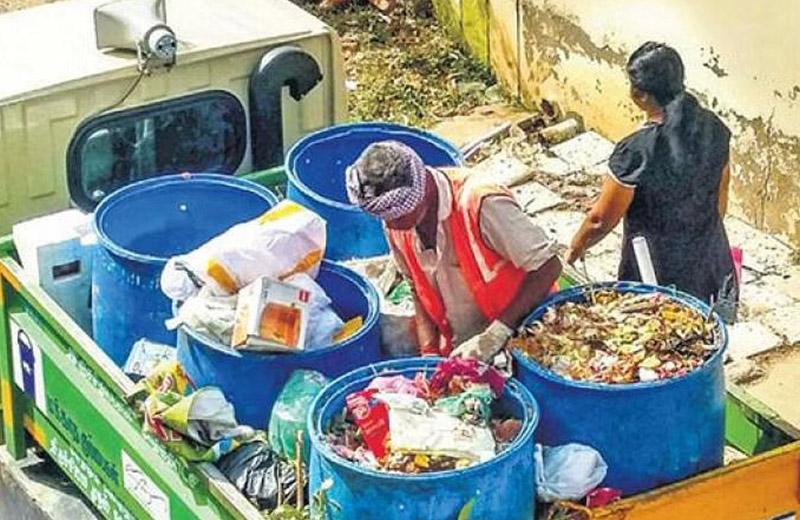Featured in THE NEW INDIAN EXPRESS
CHENNAI: Back in my hometown in West Africa, sanitation is a big issue as the outbreak of diseases and cholera are common,” explains junior researcher Ibrahim B Bangura. He has just returned to the city after 10 knowledge-packed days of visiting fecal waste treatment plants and speaking to government officers and sanitation workers across various cities, including Tiruchy and Thanjavur.
Post his tour, the researcher from Sierra Leone Urban Research Centre reveals he enjoyed his stay in the country. Determined, he aims to return to his country and nudge his government into tackling the sanitation question, reminding them that any conversation on health cannot leave out the matter. From February 9-16, organisations such as OVERDUE, and L’être égale among others participated in this exercise hosted by the Indian Institute of Human Settlements (IIHS)-ledTamil Nadu Urban Sanitation Support Programme (TNUSSP).
Before Ibrahim leaves, he makes his first visit to the Anna Centenary Library on Thursday evening and joins other delegates from seven African countries to discuss their tour and the often-flushed away topic — the public goal of sanitation in cities. Surrounded by free open spaces and nine glorious floors of various texts, the library — accessible to all — welcomes all stakeholders, especially citizens, to the discussion on basic development.
Sanitation is key to development and a basic part of our lives, the crowd is firmly reminded by Kavitha Wankhade, project director of TNUSSP. Throwing open the panel discussion ‘Just Sanitation: Insights from Indian and African Cities’, she says “there’s always someone to take care of waste, you flush it off and you don’t care. Often, the sanitation question comes back to caste and race. The first thing citizens can do is educate themselves about waste as they have a great role to play in societal change.” She adds that the conversation should move beyond toilet access and while it remains necessary, it is not sufficient without piped sewage or fecal sludge management.
Universal sanitation was well-overdue in the ‘80s, but decades later we are still talking about it, remarks professor Adriana Allen of University College London and OVERDUE project leader. Adriana says the project aims to tackle the taboos of sanitation. “We want to trigger and frame conversation around deficit infrastructure.”
Unfeasible solutions
Tanzania-based Dr Tim Ndezi from the Center for Community Initiatives graduated 30 years ago from a civil engineering course and later found a gap between his education and on-ground issues. “The sophisticated solutions gave the assumptions that people lived in well-designed areas with access to roads. But during my first assignment, I realised cities in Tanzania are growing in big ways, more than 70-80% live in informal settlements and it’s congested. Researchers must be trained to be innovative or flexible.” At a governance level, he adds sanitation — which has no home and is caught between ministries of health and water — needs a separate sector.
Sanitation is a new topic in Mozambique explains Hélder Domingos, Association FACE for Water and Sanitation. “Often, projects build big toilets, infrastructure, canals, and drainage. The challenge for the local government is maintenance…the municipality lacks the space to tell the World Bank that we appreciate the solution but want to do things our way.”
The government spends less than 0.02% of the budget on sanitation, explains Braima Koroma from the Sierra Leone Urban Research Centre. The researcher stressed the need for community-building programmes and resource mobilisation. Braima notes that “infrastructure in the cities of Tamil Nadu has been planned and designed to accommodate future needs.”
Role of Women
Lauding Tamil Nadu’s subsided schemes and clean public toilets, journalist Astrid Mujinga mentions the condition was different back in Africa. The president of the Cord of Congolese Women for the Equilibrium of Households/Gender says “our state built three public toilets but soon, they were not free or maintained well. Money disappears and it is shared by ‘those who look after the toilet’ here.” Responding to a question on political action, she adds that sanitation is rarely sanctioned funds and is never seen as a priority.
Astrid flags the issue of girls being taught to clean and work with sanitation at home and the neighbourhood level. “We’re not advocating for them to climb the ladder of sanitation. We need to ensure that girls don’t get married too young and cannot pursue studies, we need to educate them to study, embrace careers and help them go beyond cleaning and become engineers. Before that, we need to put preconditions,” she says.
Ndeye Penda Diouf from Observatory for Gender and Development in Saint Louis cites a study her institution did in 2016. “We did a citizen-based budget of the municipality and realised sanitation wasn’t taking gender or children on board. One thing we decided to do is make visible the invisible work of women.”
As dialogues on sanitation come to a close, Kavitha reiterates that the conversations on the issue must travel beyond words like effluent and waste management. Claudy Vohe, a translator on the panel, says that sanitation work, usually done by communities from precarious classes, should be considered a profession and not just an occupation. “There’s a need to de-stigmatise the work and value the service socially and economically.”
As the researchers and crowds leave the library, the question of the choice of location lingers. When asked, Abhilaasha from IIHS tells CE that choosing the library was a conscious decision. “Urban sanitation is a public good and it is important to have two players, the government and citizens, engaged and also (it is important) to know that cross-learning is happening between players.”
Data point: As per a TNIE report dated 23 April, 2022, in the last 29 years, at least 219 people have lost their lives while cleaning the sewers in Tamil Nadu.



Leave A Comment
You must be logged in to post a comment.